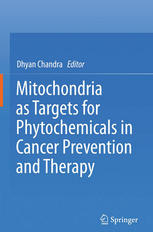

Most ebook files are in PDF format, so you can easily read them using various software such as Foxit Reader or directly on the Google Chrome browser.
Some ebook files are released by publishers in other formats such as .awz, .mobi, .epub, .fb2, etc. You may need to install specific software to read these formats on mobile/PC, such as Calibre.
Please read the tutorial at this link: https://ebookbell.com/faq
We offer FREE conversion to the popular formats you request; however, this may take some time. Therefore, right after payment, please email us, and we will try to provide the service as quickly as possible.
For some exceptional file formats or broken links (if any), please refrain from opening any disputes. Instead, email us first, and we will try to assist within a maximum of 6 hours.
EbookBell Team

4.4
92 reviewsThis book highlights the importance of phytochemicals and mitochondria in cancer prevention and therapy. Recent scientific discoveries have identified that naturally occurring biologically active compounds (i.e. phytochemicals) target multiple steps of tumorigenesis leading to the inhibition or delay in cancer progression. Mitochondria, organelles within a cell, are a critical target for phytochemicals in regulating the initiation, promotion, and progression of cancer.
The book is divided into three parts to better communicate the important findings related to phytochemicals and mitochondria in cancer research. The first part describes updates on environmental and genetic factors causing cancer initiation and progression, the role of mitochondria function in regulating the process of tumorigenesis, and the role of mitochondria in regulating cell death such as apoptosis, autophagy, and necroptosis. The second part focuses on the elucidation of key target proteins that could be exploited for cancer prevention, an the role of phytochemicals in cancer prevention, updates on basic research related to phytochemicals action critical for cancer prevention, and updates on translational knowledge on cancer prevention by phytochemicals. The third part provides updates on phytochemicals targeting mitochondria for cancer therapy, an overview of action of phytochemicals on cancer stem cells, updates on the role of microRNA in phytochemicals-based therapy of cancer, and updates on phytochemicals-based translation research on therapy for metastatic cancer.